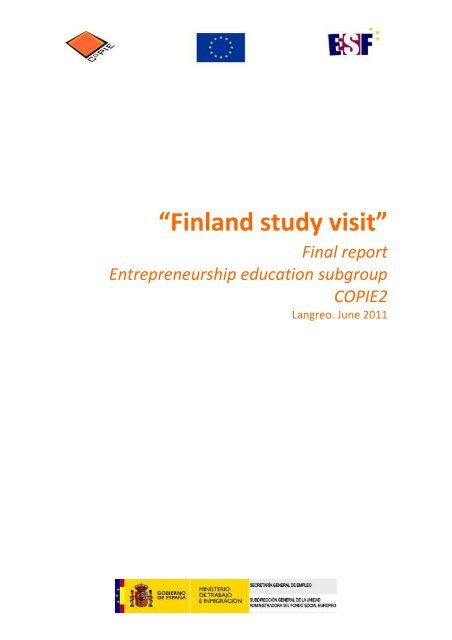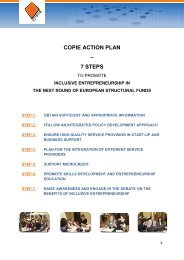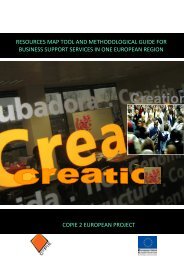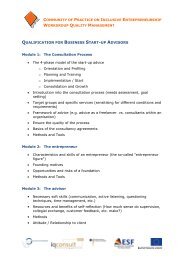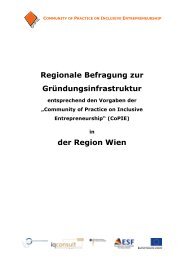Finland ESF Entrepreneurship Case Study
Finland ESF Entrepreneurship Case Study
Finland ESF Entrepreneurship Case Study
Create successful ePaper yourself
Turn your PDF publications into a flip-book with our unique Google optimized e-Paper software.
“<strong>Finland</strong> study visit”<br />
Final report<br />
<strong>Entrepreneurship</strong> education subgroup<br />
COPIE2<br />
Langreo. June 2011
Index<br />
A glimpse of the finnish education system 3<br />
Rationale 4<br />
Delegation 4<br />
Agenda 5<br />
<strong>Entrepreneurship</strong> education, a joined up approach 6<br />
Two basic policy papers to understand the importance of<br />
entrepreneurship education in <strong>Finland</strong> 8<br />
<strong>ESF</strong>, a valuable tool to improve enterprise education in <strong>Finland</strong> 9<br />
A specific National Development Programme for <strong>Entrepreneurship</strong><br />
Education 11<br />
Some <strong>ESF</strong> entrepreneurship education projects coordinated by FNBE 12<br />
Key learning points 16<br />
Reference documents 18
A glimpse of the finnish education system<br />
<strong>Finland</strong> has been consistently topping the rankings of best education systems in the<br />
last decade. The OECD Programme for International Student Assessment (PISA) has<br />
probably done more to promote a positive image of <strong>Finland</strong> around the world than any<br />
carefully designed tourism campaign. <strong>Finland</strong>’s outstanding results have attracted the<br />
attention of policymakers, media and practitioners alike on the lookout for answers<br />
that explain such success. These are some of the commonly outlined factors:<br />
□ Highly skilled teaching profession that’s also highly valued by society. It<br />
takes 5 years to become a teacher.<br />
□ A culture of trust. There’s no inspection as such. Every single stakeholder is<br />
trusted and holds a good deal of autonomy leading to greater<br />
empowerment and motivation.<br />
□ Very little examination. Students take almost no exams until the end of<br />
secondary education thus providing a much more relaxed scenario to<br />
engage in real learning.<br />
□ Streamlined national core curriculum defined by the Ministry of Education.<br />
Municipalities and schools have a great degree of freedom to adapt it to<br />
local needs.<br />
□ A certainly homogeneous student population where average performance<br />
is higher than in other countries and differences among low performing<br />
students and high achievers are smaller.<br />
□ Flexible learning pathways where it is easy to migrate between vocational<br />
and academic strands.<br />
Leaving aside this proven track record of success our area of interest was more<br />
precisely focused on the Finnish entrepreneurship education strategy whose essential<br />
features comprise a sustained and committed support on the government side<br />
complemented with a good understanding of the need to engage a broad number of<br />
stakeholders
Rationale<br />
<strong>Finland</strong> was chosen as a final destination as it has been consistently using <strong>ESF</strong> funds to<br />
finance entrepreneurship education projects. Thus, we thought some useful learning<br />
lessons could be hopefully derived from the finnish experience and hopefully provide<br />
some hints on how to open up new funding possibilities for entrepreneurship<br />
education projects within the framework of <strong>ESF</strong> 2014-2020 programming period in<br />
other Member States and regions.<br />
The study visit was organised to gain a deeper insight into:<br />
□ Integration of entrepreneurship education within current <strong>Finland</strong>’s <strong>ESF</strong><br />
Operational Programme.<br />
□ Coordination method between <strong>ESF</strong> and the Ministry of Education<br />
□ Implementation and impact of <strong>ESF</strong>-funded entrepreneurship education<br />
projects.<br />
Delegation<br />
Our delegation was formed by:<br />
□ Gerhild Vollherbst. Programme manager. Deutsche Kinder und Jugend<br />
Stiftung. Germany.<br />
□ Ilse Boeykens. Policy Advisor. Department of <strong>Entrepreneurship</strong> and<br />
Innovation. Government of Flanders. Belgium<br />
□ Antonio Georgopalis. European Social Fund Agency Flanders. Belgium<br />
□ Iván Diego. COPIE2 expert. Spain.
Agenda<br />
Tuesday 31 May<br />
9.30 – 11.30 Visit to the Ministry of Education and Culture<br />
http://www.minedu.fi/OPM/lang=en<br />
“Guidelines for <strong>Entrepreneurship</strong> Education” by Mr Jussi Pihkala<br />
(Counsellor of Education, Ministry of Education)<br />
“<strong>ESF</strong> programme for Mainland <strong>Finland</strong> and the Administration<br />
Structure of <strong>ESF</strong>” by Ms Leena Lyra (Senior Adviser, Ministry of<br />
Education)<br />
“<strong>ESF</strong> Priority 4 Transnational and inter-regional cooperation in <strong>ESF</strong><br />
activities in <strong>Finland</strong>” by Ms. Varpu Taarna (Senior Adviser, Ministry of<br />
Employment and the Economy)<br />
13.00 – 15.00 Visit to Finnish National Board of Education - FNBE<br />
http://www.oph.fi/english<br />
Wednesday 1 June<br />
“Driving change through <strong>Entrepreneurship</strong> Education and<br />
Competence” Development Programme by Ms. Minna Bálint (Project<br />
manager, FNBE)<br />
9.30 – 12.30 Visit to Finnish National Board of Education – FNBE<br />
<strong>ESF</strong>-funded <strong>Entrepreneurship</strong> Education projects<br />
“YES centres” by Ms. Virpi Utriainen, Project manager<br />
http://www.yes-keskus.fi<br />
“Measurent tool for entrepreneurship education” by Ms. Jaana<br />
Seikkula-Leino, Project manager<br />
http://developmentcentre.lut.fi/english.asp<br />
“YVI, developing Finnish teacher education through integrating<br />
entrepreneurship education” by Ms. Jaana Seikkula-Leino, Project<br />
manager<br />
http://www.yvi.fi/
<strong>Entrepreneurship</strong> education, a joined up<br />
approach<br />
The main features of entrepreneurship education in <strong>Finland</strong> have already been<br />
covered in one of the sections of this subgroup baseline study so we would kindly ask<br />
you to refer to this document for further information.<br />
However we will carry out a quick analysis of <strong>Finland</strong> National <strong>Entrepreneurship</strong><br />
Education Strategy using the framework provided by DG Enterprise in the “Towards<br />
Greater Cooperation and Coherence in <strong>Entrepreneurship</strong> Education” (EC, 2010) where<br />
the main elements of and ideal National <strong>Entrepreneurship</strong> Strategy have been<br />
outlined:<br />
1. An agreed definition of terms of reference – what is <strong>Entrepreneurship</strong> Education<br />
The document “Guidelines for <strong>Entrepreneurship</strong> Education” (Ministry of<br />
Education, 2010) includes a clear definition:<br />
“<strong>Entrepreneurship</strong> education mainly refers to a wide-ranging work done<br />
within the education administration with a view to enhancing<br />
entrepreneurship. […] Practical measures are geared to inculcate<br />
positive attitudes and develop knowledge and skills relating to<br />
entrepreneurship, create new business, upgrade entrepreneurs’ skills<br />
and their personnels’ competencies and bring about an entrepreneurial<br />
mode of operation at the workplace and in all other activities.<br />
<strong>Entrepreneurship</strong> education is rooted in lifelong learning and a<br />
networked mode of operation”<br />
2. Cross-ministry involvement as key stakeholders<br />
The Ministry of Education assumes a leading role in close cooperation with the<br />
Ministry of Employment and Economy. The Finnish National Board of<br />
Education is the governmental agency responsible for development of<br />
education and training and directly accountable to the Ministry of Education.<br />
3. Stakeholder consultation to establish wide-ranging buy-in and comprehension<br />
Stakeholder consultation takes place at national, regional and municipal level.<br />
For instance the Federation of Finnish Employers, Teacher Unions,
intermediary organizations and local authorities have played an important role<br />
in the identification of priorities and regularly consulted on the shaping of<br />
entrepreneurship education policies.<br />
4. Embedding core competences throughout the national curriculum<br />
<strong>Entrepreneurship</strong> is considered a key cross-curricular theme in the national<br />
core curriculum for basic, upper secondary and adults education under the<br />
headings “participatory citizenship and entrepreneurship” in basic education<br />
and “active citizenzship” in upper secondary and adults’ education.<br />
5. Developing high level and strategic aims and objectives<br />
Two documents published by the Ministry of Education, the Development<br />
plan. Education and Research. 2007-2012 and Guidelines for entrepreneurship<br />
education provide the policy backdrop for all actions promoting<br />
entrepreneurship in the education system. This clear vision is further backed<br />
up by a very good linkage and integration between strategic aims and allocation<br />
of <strong>ESF</strong> funds to projects that are already included in the 2015 priorities.<br />
6. Integrating and buttressing the strategy with identified good practice.<br />
In this particular sense, it is highly remarkable the contribution of YES centres,<br />
an <strong>ESF</strong>-funded national network of enterprise education resource centres<br />
providing advice, information and training on entrepreneurship education to<br />
teachers and schools. YES centres share and effectively disseminate<br />
information on good practices.<br />
7. Training the teachers<br />
Teacher Education was considered a critical success factor in order to push<br />
forward the enterprise education agenda in <strong>Finland</strong>. So first and foremost the<br />
focus was placed on the development of the entrepreneurial competence of<br />
teacher trainers.<br />
Currently opportunities to receive training on enterprise education are<br />
available both at Initial Teacher Education and CPD. Enterprise education is<br />
backed up by a growing body of evidence derived from research undertaken at<br />
different universities in the country.<br />
8. Developing a logic chain which includes indicators, outputs, outcomes and results<br />
The Guidelines for <strong>Entrepreneurship</strong> Education defines a specific set of priorities but<br />
quantitative indicators are left out of the picture. However <strong>Finland</strong> has gone a long<br />
way to assess entrepreneurship outputs and outcomes with evidence-based research.
9. Strategies demonstrating progression from primary through to tertiary (vocational<br />
and non vocational phases)<br />
The goals and priorities of entrepreneurship education for each level of education are<br />
clearly described in the Guidelines for <strong>Entrepreneurship</strong> Education. A set of priorities is<br />
defined from Early Childhood to Higher Education with the focus gradually tilting from<br />
the development of general soft skills on the development of business know-how and<br />
start-up procedures in VET and Higher Education. Adult Vocational Education and<br />
Training is also considered.<br />
10. Resourcing the strategy<br />
<strong>ESF</strong> is being used to finance large-scale and strategic projects on entrepreneurship<br />
education. <strong>ESF</strong>-funded projects are aligned with medium to long term policies (eg.<br />
Guidelines for <strong>Entrepreneurship</strong> Education). <strong>ESF</strong> projects act as trailblazers whose<br />
impact is used to inform future policy and improve the national core curriculum.<br />
Two basic policy papers to understand the<br />
importance of entrepreneurship<br />
education in <strong>Finland</strong><br />
Two documents published by the Ministry of Education provide the policy backdrop<br />
for all actions promoting entrepreneurship in the education system:<br />
□ Development plan. Education and Research. 2007-2012.<br />
□ Guidelines for entrepreneurship education<br />
The Development Plan 2007-2012 states the need to diversify and expand<br />
entrepreneurship education and strengthen related education and training under the<br />
heading “Connections between education and working life and the promotion of<br />
entrepreneurship education”. Specific measures are described for each level of<br />
education<br />
General education<br />
□ Embedded in national core curriculum under the heading “Active<br />
citizenship and entrepreneurship”<br />
□ <strong>Entrepreneurship</strong> education expected to play a more prominent role in<br />
Upper Secondary.
VET<br />
□ <strong>Entrepreneurship</strong> studies will be expanded in connection with the<br />
reform of curricula for Initial VET<br />
□ On-the-job learning and apprenticeships will be strengthened.<br />
Higher Education Institutions<br />
□ <strong>Entrepreneurship</strong> studies offered as optional studies to all in Higher<br />
Education Institutions<br />
□ <strong>Entrepreneurship</strong> education will be also included in researcher training.<br />
Adult Education<br />
□ Further and continuing generation will be targeted to support<br />
enterprises’ generation change processes, the creation of<br />
entrepreneurship based on a different competence base and the<br />
renewal of business.<br />
The Guidelines for <strong>Entrepreneurship</strong> Education outlines the shape of future to come<br />
forecasting a desirable state of affairs in 2015. This entails:<br />
□ Enhanced networking among stakeholders at local, regional, national<br />
and international level<br />
□ Regions and municipalities taking the lead with a well developed and<br />
extended network of regional resource centres.<br />
□ Full integration as part of national core curricula as well as schoolspecific<br />
curricula across all levels.<br />
□ Increased entrepreneurship among VET and Higher Education<br />
qualification holders<br />
□ Growing body of cross-disciplinary research on entrepreneurial learning<br />
environments and entrepreneurship pedagogy<br />
□ <strong>Entrepreneurship</strong> firmly embedded in initial teacher training and CPD.<br />
<strong>ESF</strong>, a valuable tool to improve enterprise<br />
education in <strong>Finland</strong><br />
<strong>ESF</strong> has proven to be a very effective tool to finance entrepreneurship education<br />
projects in <strong>Finland</strong> during the current programming period (2007-2013).
<strong>ESF</strong> Operational Programme in <strong>Finland</strong> has identified 4 key priorities:<br />
□ Priority 1. Development of work organisations, the workforce and<br />
enterprises and promoting entrepreneurship.<br />
□ Priority 2. Promoting access to employment and sustainable inclusion in<br />
the labour market and preventing social exclusion<br />
□ Priority3. Devlopment of expertise and service systems that promote the<br />
functioning of the labour market.<br />
□ Priority 4. Transnational and inter-regional <strong>ESF</strong> Actions (not covered by<br />
FNBE)<br />
In order to meet the goals set for each priority, the <strong>ESF</strong> Fund Programme for Mainland<br />
<strong>Finland</strong> is structured in different National Development Programmes whose main<br />
features are described below:<br />
□ Covers a particular area: employment, workforce, entrepreneurship,<br />
education and wellbeing at work<br />
□ Aims to improve and renew current operating models, pilot new<br />
initiatives and disseminate info on best practices<br />
□ Comprises a number of projects<br />
□ Pools results and practices from individual projects<br />
□ Offers support structure for projects<br />
□ Monitors projects profitability and impacts<br />
□ Ensures projects meet objectives and form a strategic development<br />
entity<br />
□ Promotes networked cooperation between projects<br />
□ Disseminate best practices and embed in order to secure sustainability<br />
Projects are implemented regionally and funded by the Centres for Economic<br />
Development, Transport and the Environment and the Finnish National Board of<br />
Education (FNBE) so that the national strategy is matched with local needs.<br />
<strong>ESF</strong> support to entrepreneurship education is basically provided via the “Driving<br />
Change through <strong>Entrepreneurship</strong> Education and Competence” Development<br />
Programme included in “Priority 1. Development of work organisations, the<br />
workforce and enterprises and promoting entrepreneurship. “
A specific National Development<br />
Programme for <strong>Entrepreneurship</strong><br />
Education<br />
“Driving Change through <strong>Entrepreneurship</strong> Education and Competence”<br />
Development Programme allocates 7.6 € Million during the current programming<br />
period 2007-2013 to strengthen the role of entrepreneurship education and improve<br />
the competence of teaching staff. The Finnish National Board of Education is the<br />
funding authority and grants support for <strong>ESF</strong> projects developing entrepreneurship<br />
education.<br />
The Finnish National Board of Education (FNBE) is the agency responsible for the<br />
development of education and training in <strong>Finland</strong>, from pre-primary to VET and Adult<br />
Education. FNBE is directly accountable to the Ministry of Education and Culture.<br />
The <strong>ESF</strong> unit within FNBE is in charge of:<br />
□ Implementation of project application procedures and selection of projects<br />
□ Monitoring and supervision of project activities<br />
□ Dissemination of good practice<br />
□ Promotion of networked cooperation between projects<br />
“Driving Change through <strong>Entrepreneurship</strong> Education and Competence” is one of the<br />
five National Development Programmes funded by FNBE with leverage from <strong>ESF</strong>. It<br />
aims to:<br />
1. Promote teachers’ and principals’ competence in entrepreneurship<br />
education<br />
2. Create regional networks across school boundaries, comprising different<br />
stakeholders<br />
3. Build learning pathways supporting business and entrepreneurial<br />
competence from pre-primary to higher education<br />
4. Develop learning environments and teaching materials familiarising<br />
learners with business activities and increasing action-based learning for<br />
individuals and groups<br />
A steering group set up at the Ministry of Education oversees the development of the<br />
National Programme. FNBE manages <strong>ESF</strong> money and deals directly with project<br />
promoters. FNBE favours large-scale, ambitious projects with potential to improve
national core curriculum and inform future policies. Each project is allocated roughly 1<br />
million € and is developed in 3 years.<br />
Throughout 2007-2013 FNBE has opened 2 application periods. Project selection<br />
follows the principles of openness and transparency. Application must comply with<br />
general <strong>ESF</strong> requirements plus specific selection criteria for each Development<br />
Programme. Thirty two project proposals were submitted and seven were finally<br />
approved:<br />
1. YES Centres. Regional resource centres for entrepreneurship education<br />
2. NY (Young Enterprise). Private-led initiative that has become a solid part of<br />
schools’ curricula<br />
3. Measurement Tool for <strong>Entrepreneurship</strong> Education. University of Laapenranta.<br />
A self-assessment tool to diagnose teachers’ pedagogical approaches to<br />
entrepreneurship education.<br />
4. YVI. University of Turku.Developing Finnish Teacher Education through<br />
integrating entrepreneurship education as part of initial teacher training.<br />
5. HOPE. Encouragement of business start-up in VET schools<br />
6. Yrittäjyyskasvatuksen Polksu. Learning pathway supporting entrepreneurial<br />
competence across school boundaries.<br />
7. Assembling project. Aalto University. Helsinki School of Economics. Collection<br />
and analysis of best pedagogical practices during period 2002-2010.<br />
The profile of project promoters is diverse. Universities, regional development centres,<br />
private institutions. Projects receive up to 85% <strong>ESF</strong> funding and the rest is covered by<br />
municipalities.<br />
Some <strong>ESF</strong> entrepreneurship education<br />
projects coordinated by FNBE<br />
YES centres<br />
YES centres provide practical services supporting entrepreneurship education for<br />
teaching staff from pre-primary to higher education. The service has been designed to<br />
provide easy and fast access to learning resources, research and best practices on<br />
entrepreneurship education. YES centres bring together teachers, entrepreneurs and<br />
other relevant stakeholders. Whereas most of them are located in a physical space<br />
some of them consist mainly of a travelling regional chief that provides support to<br />
schools.
Inspired by a Canadian initiative, the first YES centre was set up in Kokkola back in<br />
2000 and the project has been scaled up with <strong>ESF</strong> support. Currently there are 17 YES<br />
centres in operation throughout the country under the umbrella of a recently<br />
registered YES association to coordinate network actions.<br />
YES centres could be defined as action-oriented hubs for entrepreneurship education.<br />
YES activities include:<br />
□ Local and national training events for teachers<br />
□ Reinforcement of school-business cooperation<br />
□ Development of teaching resources and curricular content together with<br />
teachers<br />
□ Exchange and dissemination of entrepreneurship education resources<br />
developed at regional or national level.<br />
□ Service of Junior Achievement-Young Enterprise <strong>Finland</strong>.<br />
Four catalogues are published every year following a simple colour code.<br />
□ Yellow: Overview of recent research and teaching resources.<br />
□ Green: Compendium of Best Practices across regions.<br />
□ Red: Compendium of best practices on School-Business cooperation<br />
□ Purple: Guidelines and practical examples to embed <strong>Entrepreneurship</strong><br />
Education in different subjects.<br />
YES centres figure prominently in the projected state of affairs as described in the<br />
Guidelines for <strong>Entrepreneurship</strong> Education. Thus, in 2015 these regional resource<br />
centres are expected to reassert their position and cover the whole country. This is a<br />
good example of scaling up and effective use of <strong>ESF</strong> funds to inform future policy.<br />
Once <strong>ESF</strong> funding is discontinued YES centres costs will be assumed by municipalities<br />
thus securing sustainability.<br />
2008-2011<br />
http://www.yes-keskus.fi<br />
contact: Virpi Utriainen<br />
mail: virpi@nuoriyrittajyys.fi<br />
Measurement Tool for <strong>Entrepreneurship</strong> Education<br />
Lappeenranta University of Technology coordinates this 4-year development project<br />
started in 2008. The project seeks to design a self-assessment tool for teachers to<br />
prompt a reflection on the extent to which they daily teaching practice promotes<br />
entrepreneurial skills and attitudes. Baseline research concluded teachers were<br />
confused about the aims and practices of <strong>Entrepreneurship</strong> Education. The
measurement tool is expected to strengthen teacher’s role as learners of<br />
<strong>Entrepreneurship</strong> Education.<br />
The tool is a web-based survey (www.lut.fi/entre) and is divided into 5 broad<br />
categories:<br />
□ <strong>Entrepreneurship</strong> & <strong>Entrepreneurship</strong> Education<br />
□ Pedagogical solutions<br />
□ Operating culture<br />
□ Learning environments<br />
□ Operation in networks<br />
It takes approximately 15 minutes to fill the questionnaire. Questions deal mainly with<br />
pedagogical issues. For instance, teachers are asked to look back to the last six months<br />
and think about how often they have used different methodologies. Teachers’ input is<br />
automatically processed and a feedback e-mail is sent back containing links and tips to<br />
improve teaching.<br />
Research is an integral part of the project and together with users’ tests and feedback<br />
has contributed to fine-tune the tool. The tool will be launched nationally in 2011.<br />
Joined up approach and synergies among projects have been identified as one of the<br />
main strengths of National Development Programmes. In this particular case, the<br />
Lappeenranta University of Technology has trained YES centres staff to implement the<br />
tool in order to facilitate widespread implementation of the tool next autumn.<br />
2008-2012<br />
http://www.lut.fi/entre<br />
contact: Elena Ruskovaara<br />
mail: elena.ruskovaara@lut.fi<br />
YVI. Virtual learning environment and entrepreneurship education in initial teacher<br />
training.<br />
YVI is a nationwide, multidisciplinary research and development project coordinated<br />
by the Teacher Training School of Turku University. Twenty-six different partners are<br />
involved in this project comprising Teacher Training Schools, Departments of Teacher<br />
Education, Universities, VET schools, business organizations and regional and national<br />
authorities.<br />
YVI intends to generate a virtual learning environment of entrepreneurship education<br />
that acts as a one-stop shop, a reference point for teacher educators willing to develop<br />
the pedagogical aspects of entrepreneurship education. Teaching materials will be<br />
categorized according to school level.
At present <strong>Entrepreneurship</strong> Education is only compulsory in two teacher training<br />
centres. By the year 2013, YVI project aims to have it embedded as part of all teacher<br />
education courses. The learning environment will facilitate integration of<br />
entrepreneurship in strategies and curricula through joined up planning,<br />
implementation and evaluation. By the same token, networking and multidisciplinary<br />
research will be strengthened.<br />
Seamless collaboration and support between projects could be again highlighted. YVI<br />
Learning Environment is being used to disseminate the Measurement Tool for<br />
<strong>Entrepreneurship</strong> Education and local YES centre provides a valuable input to the<br />
actions developed by Teacher Training Institute at University of Turku.<br />
2010-2013<br />
http://www.yvi.fi<br />
contact: Jaana Seikkula-Leino<br />
mail: jaasei@utu.fi<br />
Some other interesting projects in progress funded by FNBE with leverage from <strong>ESF</strong><br />
will further enrich this picture. This is the case of the Assembling Project, a mapping of<br />
150 best pedagogical practices in entrepreneurship education from 2000 to 2010<br />
currently developed by Aalto University School of Economics. Results will be ready by<br />
spring 2012.
Key learning points<br />
The national development programme “Driving Change through <strong>Entrepreneurship</strong><br />
Education and Competence” led by FNBE provides a general framework and a clear set<br />
of priorities. FNBE directs <strong>ESF</strong> funding to large scale, strategic and ambitious 3-year<br />
projects that have a direct impact in the design and implementation of national core<br />
curriculum. It can be said that these projects act as trailblazers that will inform future<br />
policies on the educational arena.<br />
Concentrating funding on large projects is seen as a more effective way of investing<br />
resources and securing scalability and impact. This is certainly a move away from the<br />
“let a thousand flowers bloom” strategy that characterises other funding streams such<br />
as the Lifelong Learning Programme. The tricky issue of overlapping funding streams<br />
for entrepreneurship education is out of the question in <strong>Finland</strong>. <strong>ESF</strong> leverage is mainly<br />
used to develop strategic goals at national level that are aligned with priorities<br />
contained in broader policy documents such as the “Guidelines for <strong>Entrepreneurship</strong><br />
Education”.<br />
Coordinated efforts to push forward the entrepreneurship education agenda have first<br />
and foremost concentrated on teachers. Analyzing teachers’ perceptions through<br />
research paved the way to design strategies aimed at positioning entrepreneurship<br />
higher up in the list of priorities. The review of the national development programme<br />
gives us a flavour of the potential of <strong>ESF</strong> leverage to improve entrepreneurship<br />
education in what represents a thoughtful and carefully orchestrated strategy at<br />
national level. The self-diagnostic tool, YES regional resource centres, YVI initial<br />
teacher training and online learning environment represent some of the elements of a<br />
full package of measures that support teachers in that transition to a new culture of<br />
learning and teaching.<br />
As it has been earlier noted in this report, FNBE, as the umbrella organization<br />
encourages cross-pollination among projects thus securing a joined up approach and<br />
good dissemination and mainstreaming.<br />
Pedagogical research is a built-in feature in all <strong>ESF</strong> entrepreneurship education<br />
projects. In this sense, a growing body of evidence-based research will support<br />
efficient and effective decision making.<br />
<strong>Entrepreneurship</strong> education is at the heart of the reforms needed in Europe for the<br />
future. The combination of entrepreneurship and education is highlighted both in the<br />
Europe 2020 strategy and in the new European employment guidelines. Thus<br />
entrepreneurship education must be one of the key elements to secure smart and<br />
inclusive growth for Europe
Although entrepreneurship education is currently being financed with <strong>ESF</strong> funds in<br />
some regions and Member States, there is a strong need to reinforce this option in the<br />
next programming period. <strong>Finland</strong> focuses on improving the knowledge and skills of<br />
teaching staff by promoting entrepreneurship, a goal completely relevant and<br />
compliant with the scope of <strong>ESF</strong> policy. We hope the <strong>Finland</strong> experience inspires<br />
other Member States and regions to open up funding possibilities for entrepreneurship<br />
education projects within the framework of <strong>ESF</strong> 2014-2020 programming period.<br />
Contact<br />
Iván Diego Rodriguez<br />
ivan@valnalon.com
Reference documents<br />
□ A strategic framework for European cooperation in education and training<br />
("ET 2020") Council conclusions.2009<br />
□ Baseline study on enterprise education. COPIE2. 2009<br />
□ Education and Research 2007-2012. Development Plan. Opetusministeriö.<br />
Finnish Ministry of Education. 2007<br />
□ Guidelines for entrepreneurship education. Opetusministeriö. Finnish<br />
Ministry of Education. 2009<br />
□ National Development Programmes. European Social Fund Programme for<br />
Mainland <strong>Finland</strong> 2007-2013. Ministry of Employment and the Economy.<br />
2010.<br />
□ Towards greater cooperation and coherence in entrepreneurship<br />
education. European Commission. 2010


